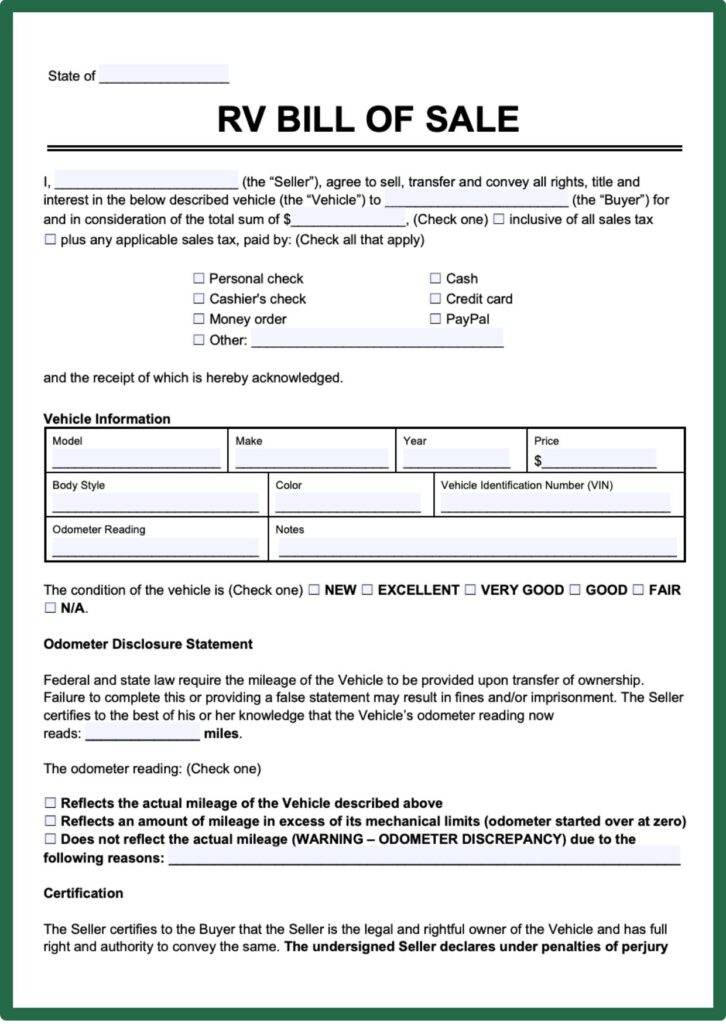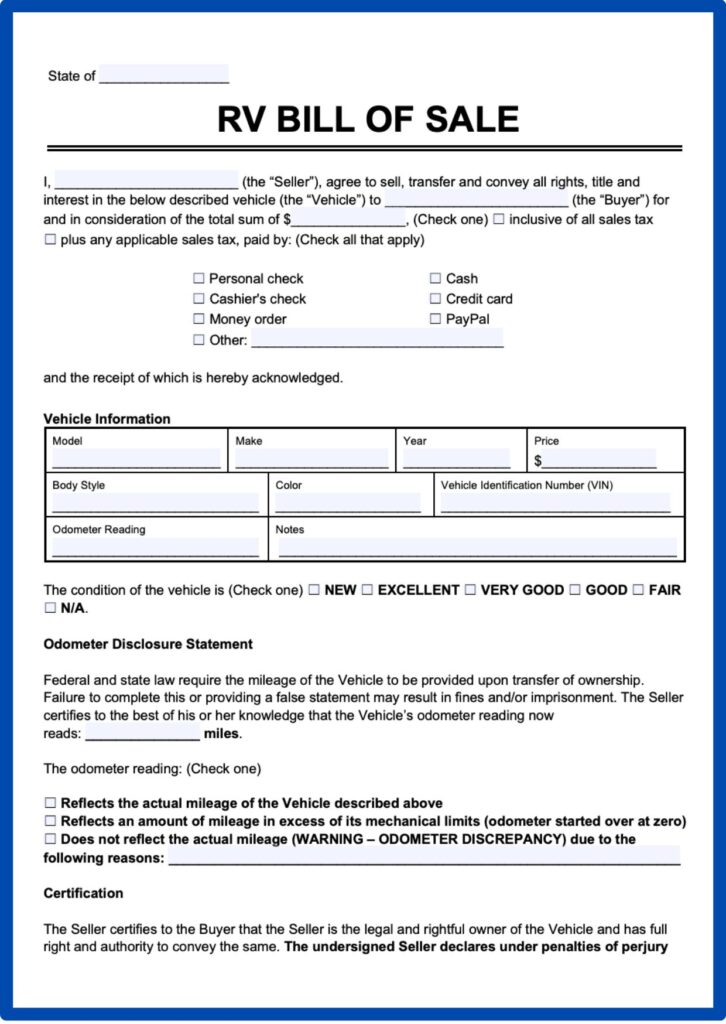An RV Bill of Sale is a crucial legal document used in the transfer of ownership of recreational vehicles (RVs) from one party to another. In Texas, this document serves as a formal agreement that outlines the details of the transaction, including the parties involved, the RV’s specifications, and the sale price. The RV Bill of Sale Texas is particularly important because it not only provides proof of the sale but also protects both the buyer and seller by ensuring that the transaction is documented properly.
Having a Bill of Sale for RV in Texas is essential for various reasons. Firstly, it facilitates the transfer of the vehicle’s title, which is a legal requirement when ownership changes. Additionally, the Bill of Sale RV Texas can serve as a valuable record for future reference, especially if any disputes arise regarding the transaction. By detailing the terms of the sale, this document helps to clarify the responsibilities of both parties, making it a vital component of any RV sale in Texas.
Free RV bill of Sale Texas Template
A Free RV Bill of Sale Texas Template is an essential document for anyone buying or selling a recreational vehicle (RV) in Texas. This legally binding agreement outlines the transaction details and protects both parties involved. Key points to consider include:
- Identification of Parties: Clearly states the buyer and seller’s names and addresses.
- Vehicle Description: Provides specifics such as the RV’s make, model, year, and Vehicle Identification Number (VIN).
- Purchase Price: Lists the agreed-upon price for the transaction.
- Date of Sale: Indicates when the sale took place.
- Signatures: Requires both parties’ signatures for validity.
Using a template ensures compliance with Texas state laws and facilitates a smooth transfer of ownership.
Bill of Sale For RV Trailer in Texas
A Bill of Sale for an RV trailer in Texas is a crucial document that formalizes the transfer of ownership from the seller to the buyer. It serves as proof of the transaction and is often required for registration purposes. Key points include:
- Identification of Parties: Names and addresses of the buyer and seller.
- Description of the RV: Year, make, model, VIN, and any distinguishing features.
- Purchase Price: The agreed-upon amount for the sale.
- Date of Sale: When the transaction occurs.
- Signatures: Both parties must sign to validate the agreement.
This document ensures a clear record of ownership and protects both parties in the transaction.
Legal Considerations
When completing a Texas RV Bill of Sale, it’s important to understand the legal aspects that ensure the transaction is valid and protects both the buyer and seller. In Texas, the Bill of Sale acts as an official record of the transaction, but there are additional legal considerations to keep in mind to avoid complications in ownership transfer or disputes in the future.
Key Legal Considerations:
- Importance of Notarization (if applicable)
While notarization of the bill of sale for RV in Texas is not always required, it may be advisable in certain situations. Notarizing the document provides an extra layer of authenticity and helps verify that the signatures are genuine, reducing the risk of disputes. Notarization can be especially beneficial if the transaction involves a high-value RV or if either party wants to ensure maximum legal protection. - Record-Keeping Recommendations for Both Parties
Both the buyer and the seller should keep a copy of the bill of sale RV Texas for their records. The buyer will need this document when registering the RV and transferring the title with the Texas Department of Motor Vehicles (DMV). For the seller, keeping a copy serves as proof that the sale was completed and releases them from any future liability tied to the vehicle. Retaining the Texas RV Bill of Sale in a secure place is essential in case of tax inquiries or legal issues related to the sale. - Implications of Not Having a Bill of Sale
Failing to have a bill of sale for RV in Texas can lead to significant legal complications. Without a proper Texas RV Bill of Sale, the buyer may have difficulty transferring the title and registering the vehicle, while the seller might still be held accountable for the RV. Additionally, if a dispute over the sale terms or vehicle condition arises, having no bill of sale RV Texas can make it challenging to resolve the issue, leaving both parties vulnerable to potential legal disputes or financial loss.
Filling Out the Bill of Sale
Completing a Texas RV Bill of Sale accurately is essential to ensure a smooth transfer of ownership and avoid future complications. Below is a step-by-step guide on how to fill out the document, along with common mistakes to avoid.
Step-by-Step Guide on Completing the Bill of Sale
- Gather Necessary Information
Before filling out the document, both the buyer and the seller should gather key information, including the RV’s make, model, year, VIN (Vehicle Identification Number), and odometer reading. This will ensure that all details are accurately recorded. - Seller’s Information
Enter the seller’s full name, address, and contact details. Make sure this information is accurate, as it will be used for official documentation purposes. - Buyer’s Information
Similarly, input the buyer’s full name, address, and contact details. This information will help confirm the identity of the new owner when registering the RV. - RV Description
Provide detailed information about the RV, including the make, model, year, VIN, and odometer reading. Double-check the VIN, as any errors here can cause delays in transferring the title. - Sale Price and Payment Terms
Clearly state the sale price agreed upon by both parties. If applicable, include any payment terms (e.g., if the payment is in installments or made via a specific method). Be clear about the total amount to avoid disputes later. - Sale Date
Record the exact date the transaction takes place. This is essential for tracking the ownership transfer timeline and ensuring the title is transferred promptly. - Disclosure of Liens or Encumbrances
If there are any liens or encumbrances on the RV, such as a loan or outstanding debt, ensure that this information is disclosed in the document. The seller should affirm that all legal obligations tied to the RV are disclosed to the buyer. - As-Is Condition Clause
If the RV is being sold “as-is” (without any warranties), include a clause stating that the buyer accepts the RV in its current condition. This will protect the seller from any claims regarding the RV’s condition after the sale. - Signatures
Both the buyer and seller must sign the document to make it legally binding. Make sure the signatures are clear and dated appropriately. - Optional: Notarization
If you want an extra layer of legal protection, consider having the document notarized, especially for high-value sales.
Common Mistakes to Avoid
- Incorrect or Missing Information
One of the most common mistakes is leaving out essential information or entering incorrect details, especially regarding the VIN or sale price. Always double-check that all fields are completed and accurate. - Failing to Specify Payment Terms
If payment is not made in full at the time of sale, make sure the agreed-upon terms are clearly written. This avoids potential disputes over installment payments or methods. - Not Including the As-Is Clause
Forgetting to include an “as-is” clause can leave the seller open to future claims about the RV’s condition. Ensure this clause is present if the RV is being sold without warranties. - Inconsistent Dates
Make sure that the sale date and the signature dates align. Inconsistent dates can cause confusion and legal complications during the title transfer process. - Not Keeping Copies
Both the buyer and the seller should keep copies of the completed Texas RV Bill of Sale. Not having a copy can cause issues when proving the transaction or when dealing with registration and title transfer.
By following these steps and avoiding common mistakes, you can ensure that the Texas RV Bill of Sale is completed accurately, protecting both parties and ensuring a smooth transfer of ownership.
After the Sale: Next Steps
Once the Texas RV Bill of Sale is completed, signed, and exchanged, there are several important steps both the buyer and seller must take to finalize the transaction. These post-sale actions ensure the proper transfer of ownership, compliance with Texas laws, and legal protection for both parties.
1. Transferring the Title at the Texas DMV
After the sale, the buyer must transfer the RV’s title through the Texas Department of Motor Vehicles (DMV). This process is crucial for establishing legal ownership of the RV and must be completed within 30 days of the sale. Here’s how to do it:
- Required Documents: The buyer will need to bring the signed Texas RV Bill of Sale, the current title signed by the seller, proof of insurance, and a valid ID to the DMV.
- Title Application: The buyer must complete an Application for Texas Title and/or Registration (Form 130-U) to initiate the transfer.
- Title Transfer Fee: There is a fee associated with transferring the title, which varies depending on the county and the type of vehicle.
- Lien Release: If there were any liens on the RV, the seller must provide a lien release document to prove that the vehicle is free from encumbrances.
2. Updating Registration
In addition to transferring the title, the buyer must also update the RV’s registration with the DMV:
- Proof of Insurance: Texas law requires that all vehicles, including RVs, have insurance before they can be registered. The buyer will need to present proof of insurance when registering the RV.
- Vehicle Inspection: If the RV is motorized, a vehicle safety inspection may be required before it can be registered. This ensures the RV meets Texas road safety standards.
- Pay Registration Fees: The buyer will need to pay the applicable registration fees to receive new license plates and registration stickers. The amount varies based on the weight and type of RV.
- Temporary Permits (if needed): If the buyer needs to operate the RV before completing the registration process, a temporary permit can be issued by the DMV to allow legal operation during the transition period.
3. Insurance Considerations
Both the buyer and seller should update their insurance policies immediately after the sale to avoid any coverage issues:
- For the Buyer: The buyer must obtain or update their insurance policy to cover the RV. Texas law mandates liability insurance at a minimum, but the buyer may want to consider additional coverage options such as comprehensive or collision coverage to protect the vehicle fully.
- For the Seller: Once the RV is sold and the Bill of Sale is completed, the seller should inform their insurance company and cancel or modify the existing policy to remove the RV from their coverage. This ensures the seller is not liable for any incidents involving the RV after the sale.
By completing these steps, both the buyer and seller can ensure the legal transfer of ownership, protect themselves from liability, and comply with Texas laws regarding vehicle ownership and operation.
FAQ
What is a Texas RV Bill of Sale?
A Texas RV Bill of Sale is a legal document that records the sale of a recreational vehicle (RV) between a buyer and seller. It includes key details such as the buyer’s and seller’s names, the RV’s make, model, year, Vehicle Identification Number (VIN), sale price, and the date of the transaction. While not always required by law, it serves as proof of the sale and helps with transferring the RV’s title and registration through the Texas Department of Motor Vehicles (DMV).
Is a Bill of Sale required to sell an RV in Texas?
A Bill of Sale is not legally required to sell an RV in Texas, but it is highly recommended. It serves as proof of the transaction and provides important details like the sale price, buyer and seller information, and the RV’s condition. This document can help protect both parties, particularly when transferring the title and registering the RV with the Texas DMV. It also provides legal protection in case of disputes.
What information should be included in a Texas RV Bill of Sale?
A Texas RV Bill of Sale should include:
- Buyer and seller’s full names and contact information
- RV details (make, model, year, VIN, and odometer reading)
- Sale price and payment method
- Date of sale
- Condition of the RV (including any “as-is” disclaimers)
- Signatures of both the buyer and seller
What should I do after completing the Bill of Sale?
After completing the Texas RV Bill of Sale, the buyer should:
- Transfer the RV’s title at the Texas DMV within 30 days
- Update the vehicle’s registration
- Ensure the RV is insured as required by Texas law
The seller should notify their insurance company, keep a copy of the bill of sale, and ensure the title is properly signed over to the buyer to release them from any liability.

Hi, I’m William Bennett, an Automotive Executive based in Houston, Texas. With years of experience in the automotive industry, I created Bill of Sale Texas to offer Texans a straightforward resource for managing bill of sale documents. My goal is to help make the process of buying and selling vehicles in Texas as smooth and informed as possible.
![Bill of Sale Texas For Car, Vehicle [Edit & Printable] PDF](https://billofsaletexas.com/wordpress/wp-content/uploads/2024/11/Bill-of-Sale-texas-1-160x45.png)

